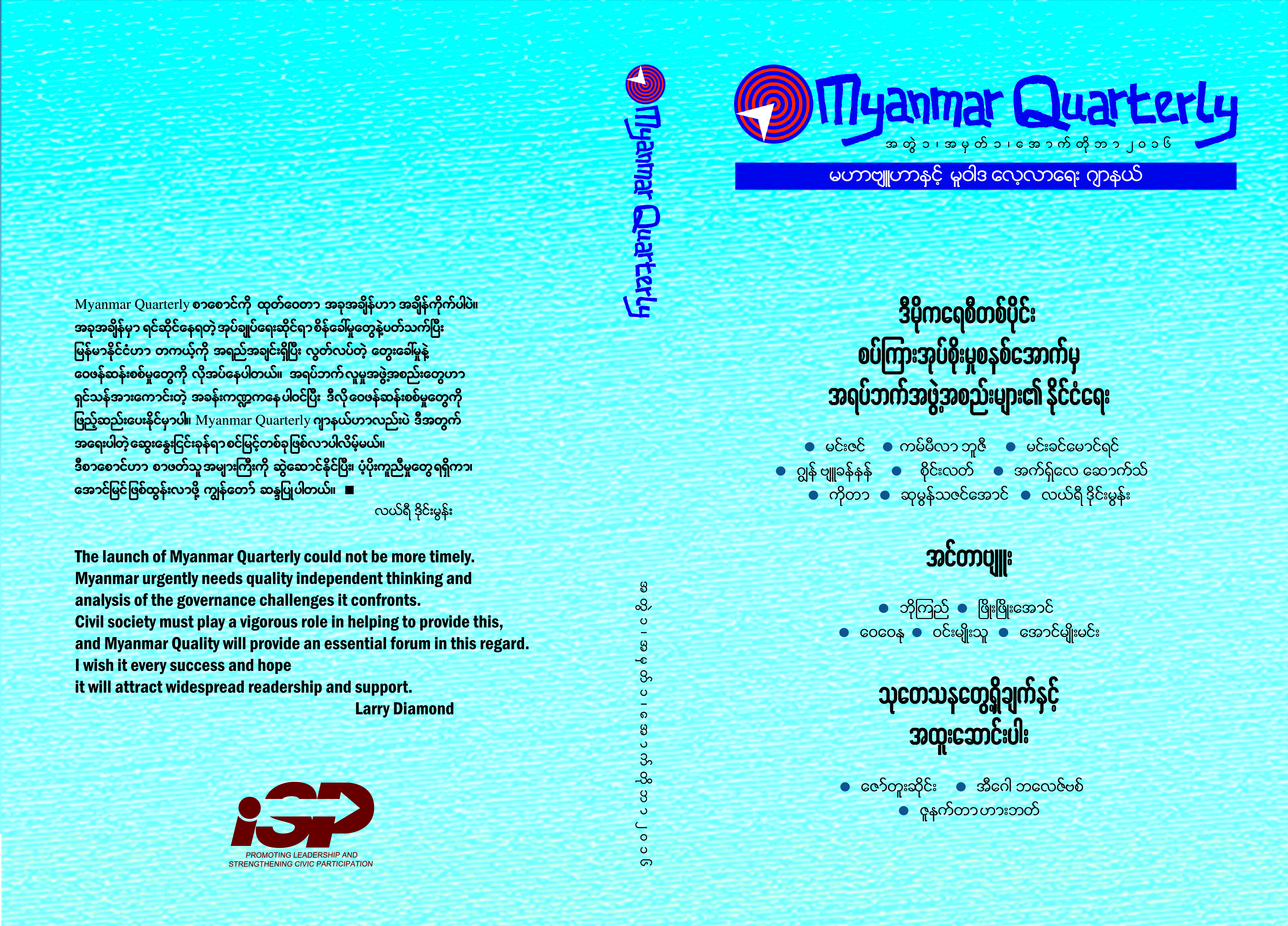ဒီမိုကရေစီတပိုင်း စပ်ကြားအုပ်စိုးမှု စနစ်အောက်မှ အရပ်ဘက်အဖွဲ့အစည်းများ၏ နိုင်ငံရေး
အမှတ် ၁၊ အောက်တိုဘာ ၂၀၁၆
တပ်မတော် ကျောထောက် နောက်ခံပြုထားတဲ့ ပြည်ခိုင်ဖြိုး ပါတီအစိုးရကနေ ဒေါ်အောင်ဆန်းစုကြည် ဦးဆောင်တဲ့ အမျိုးသား ဒီမိုကရေစီ အစိုးရကို ၂၀၁၆ ဧပြီလမှာ အာဏာ လွှဲပြောင်းပေးခဲ့ပါတယ်။ မြန်မာနိုင်ငံဟာ နိုင်ငံရေး အသွင်ကူးပြောင်းရေးရဲ့ ဒုတိယအဆင့်ကို တက်လှမ်းနိုင်ခဲ့ပြီလို့ဆိုနိုင်ပါတယ်။ မြန်မာစကားပုံမှာ ”တဂူတည်း ခြင်္သေ့နှစ်ကောင် မအောင်းနိုင်ဘူး” လို့ အဆိုရှိပေမယ့် စစ်အစိုးရ ရေးဆွဲခဲ့တဲ့ ၂၀၀၈ အခြေခံဥပဒေဟာ တပ်မတော်နဲ့အရပ်သား အစိုးရသစ်ကို တဂူတည်း အတူ အောင်းနေဖြစ်အောင် ဖန်တီးထားပါတယ်။ တနည်း ပြောရရင်တော့ မြန်မာ့ အုပ်စိုးမှုစနစ်ဟာ ရွေးကောက်ပွဲ ဒီမိုကရေစီ တစိတ်တပိုင်းနဲ့ အာဏာရှင် အင်စတီကျုးရှင်း ကျင့်ထုံး အားကောင်း မောင်းသန်ပေါင်းစပ်ထားတဲ့ ဖားတပိုင်း ငါးတပိုင်း စနစ် hybrid regime အဖြစ် သတ်မှတ် နိုင်ပါသေးတယ်။ ဒီ့ထက်ပြောရရင် အစိုးရသစ်ဟာ သည်းခြေကြိုက် နိုင်ငံရေး ညွှတ်ချက်ရှိတာလည်း တွေ့ရပါ တယ်။ သည်းခြေကြိုက် နိုင်ငံရေး ဆိုတာကတော့ လူ့အဖွဲ့အစည်းနဲ့ နိုင်ငံတော်အကြား ပေါင်းကူး ဆက်သွယ်ပေးတဲ့ အရပ်ဘက် လူ့အဖွဲ့အစည်းတွေ၊ နိုင်ငံရေးပါတီတွေ၊ မီဒီယာတွေ၊ ပညာတတ်တွေစတဲ့ ကြားခံ အဖွဲ့အစည်း (mediating institutions) တွေရဲ့ အခန်းကဏ္ဍကို လျှော့ချပြီး လူထုကို တိုက်ရိုက် ချဉ်းကပ်တာကို ဆိုပါတယ်။ အခုလို ဖားတပိုင်း ငါးတပိုင်း စနစ်နဲ့ဒီမိုကရေစီလှုပ်ရှားမှုက ပေါက်ဖွားလာတဲ့ အစိုးရမျိုး လက်ထက်မှာ လွတ်လပ်တဲ့ အရပ်ဘက်အဖွဲ့စည်းတွေဟာ ဆန္ဒဖော်ထုတ်မှု နဲ့သဘောထား ကွဲလွဲမှုတွေကို ဘယ်လို ပြသမလဲဆိုတာ မေးခွန်းထုတ်စရာ ဖြစ်ပါတယ်။ အရပ်သား အစိုးရကရော သဘော ကွဲလွဲသူတွေကို ဘယ်လို တုန့်ပြန်မလဲ၊ ဘယ်လို ကိုင်တွဲမလဲ။ စပ်ကြား အုပ်စိုးမှုစနစ်က အရပ်ဘက်အဖွဲ့စည်းတွေနဲ့ဆန္ဒဖော်ထုတ်မှုတွေရဲ့ နည်းနာ လုပ်ဟန်ကို ဘယ်လို သြဇာ သက်ရောက်မလဲ။ အထူးသဖြင့် ငြိမ်းချမ်းရေး၊ မြေယာကိစ္စနဲ့ပညာရေး ပြုပြင်ပြောင်းလဲမှုတွေမှာ ဘယ်လို ဆန္ဒဖော်ထုတ်မှု ပုံစံသစ်တွေကို မြင်ကြရမလဲ။ အစိုးရသစ်ဟာ နိုင်ငံတကာ ကူညီ ထောက်ပံသူတွေကို ဘယ်လို ချဉ်းကပ်ပြီး ပြည်တွင်း အရပ်ဘက်အဖွဲ့စည်းတွေနဲ့ဆန္ဒဖော်ထုတ်မှုတွေ နိုင်ငံတကာ အထောက်အပံ ရရှိနေတာတွေကို ကန့်သတ်မလား။ အောက်တိုဘာထုတ် Myanmar Quarterly မဟာဗျုဟာနဲ့မူဝါဒဂျာနယ်ဟာ နိုင်ငံရေး ဝန်းကျင်သစ်ကို ရှင်းလင်းပြီး အထက်ပါ မေးခွန်းတွေကို ဖြေဆိုဖို့ ရည်ရွယ်ပါတယ်။
Politics of Protest and CSOs in Hybrid Regime: 1st Issue, October 2016
Burma/Myanmar has entered its second phase of political transition, shifting power from the military-backed Union Solidarity and Development Party (USDP) government to the elected National League for Democracy (NLD) party led by Aung San Suu Kyi in April 2016. Contrary to the old Burmese saying that “there is no room for two lions to dwell in the same cave,” the military-drafted constitution forces both the armed forces (Tatmadaw) and the newly elected civilian government to cohabit in the polity. In other word, the country’s governance system is still fit to be categorized as a hybrid regime involving some elements of electoral democracy together with the strength of authoritarian institutions. Moreover, the new administration exhibits strong populist tendencies involving its mobilization of the public by means of marginalizing mediating institutions such as civil society organizations (CSOs), independent media and public intellectuals. How do independent CSOs along with dissension and protests function in this hybrid and also movement-friendly regime? How does the regime react and handle dissent? How does regime type influence the repertoires of CSOs and social movements regarding critical issues such as ethnic peace, land rights and education reform? How does the new regime engage with international donor agencies to restrict funding for local CSOs and movements? Myanmar Quarterly’s August addresses the new political context and the questions raised above.
Table of Content
မာတိကာ
I. Editor’s Words
၁။ အယ်ဒီတာ့ စကား
II. Foreword by Larry Diamond
၂။ လယ်ရီဒိုင်းမွန်း၏ အမှာစကား
III. Cover Stories, Interviews and Book Reviews
၃။ မျက်နှာဖုံးဆောင်းပါးများ၊ အင်တာဗျုးများ နှင့် စာအုပ်သုံးသပ်ချက်များ
Politics of Protest and CSOs in Hybrid Regime
ဒီမိုကရေစီတပိုင်းအစိုးရလက်ထက် အရပ်ဘက်လူ့အဖွဲ့စည်းများနှင့် ဆန္ဒဖော်ထုတ်မှုများ၏ နိုင်ငံရေး
(a) Politics of Civil Society in Hybrid Regime by Min Zin
(က) ဒီမိုကရေစီတစ်ပိုင်း စပ်ကြားအုပ်စိုးမှုစနစ်အောက်က အရပ်ဘက်အဖွဲ့အစည်းများ၏ နိုင်ငံရေး (မင်းဇင်)
(b) Critical perspectives on civil society by Camilla Buzzi
(ခ) အရပ်ဘက် အဖွဲ့အစည်းဆိုင်ရာ အရေးပါသည့် ရှုထောင့်အမြင်များ (ကင်မီလာဘူဇီ)
(c) A Robust and Functioning Civil Society by Min Khin Maung Yin
(ဂ) အားကောင်း ရှင်သန်သည့် အရပ်ဘက် လူမှုအဖွဲ့အစည်း (မင်းခင်မောင်ရင်)
(d) Hybird Regimes and Civil Society: Comparative Analysis from within Southeast Asia by John Buchanan
(ဃ) စပ်ကြားအုပ်ချုပ်ရေးများနှင့် လူမှုလူ့အဖွဲ့အစည်း အရှေ့တောင်အာရှ ဒေသတွင်း နှိုင်းယှဉ်လေ့လာဆန်းစစ်ချက် (ဂျွန် ဗျူခန်နန်)
(e) Views from the rulers: A manual for handling Civil Society Organizations(CSOs) and protests by Aung Thu Nyein
(င) အုပ်ချုပ်သူများဘက်မှ အမြင် အရပ်ဘက်လူမှုလူ့အဖွဲ့အစည်းများ (CSOs) နှင့် ဆန္ဒပြပွဲများကို ထိန်းချုပ်နည်း နိသျှည်း (အောင်သူငြိမ်း)
(f) Ethnic Civil Society and Myanmar’s Hybrid Regimes by Ashley South
(စ) လူနည်းစုတိုင်းရင်းသား လူမှုလူ့အဖွဲ့အစည်းနှင့် မြန်မာနိုင်ငံ၏ အာဏာရှင်တစ်ပိုင်း အုပ်ချုပ်ရေး (အက်ရှ်လေဆောက်သ်)
(g) Social Movement and ‘Framing’ by Ko Tar
(ဆ) လူထုလှုပ်ရှားမှုနှင့် ဘောင်ခေတ်ခြင်း (Framing) (ကိုတာ)
(h) Beyond Ma Ba Tha Anti-Muslim Movement: Impacts on Democratization and
National Reconciliation by Dr Sai Latt
(ဇ) မဘသ၏ မွတ်ဆလင် ဆန့်ကျင်ရေးအလွန် ဒီမိုကရေစီနှင့် အမျိုးသားရင်ကြားစေ့ရေး အကျိုးဆက်များ (ဒေါက်တာစိုင်းလတ်)
Interviews
အင်တာဗျူးများ
Bo Kyi (a former political prisoner and co-founder of the Assistance Association of Political Prisoners (AAPP)
ဦးဘိုကြည် (နိုင်ငံရေးအကျဉ်းသားဟောင်းနှင့် နိုင်ငံရေးအကျဉ်းသားများ ကူညီစောင့်ရှောက်ရေးအဖွဲ့ – AAPP ၏ အတွင်းရေးမှူး)
Phyo Phyo Aung (fomer General Secretary of the All Burma Federation of Student Unions (ABFSU) and a member of the Democratic Education Movement Leading Committee)
မဖြိုးဖြိုးအောင် (ဗမာနိုင်ငံလုံးဆိုင်ရာ ကျောင်းသားသမဂ္ဂများအဖွဲ့ချုပ်၏ အထွေထွေအတွင်းရေမှူးဟောင်းနှင့် ဒီမိုကရေစီ ပညာရေး လှုပ်ရှားမှု ဦးဆောင်ကော်မတီ အဖွဲ့ဝင်)
Wai Wai Nu (a former political prisoner and the co-founder of Justice for Women. She is also the founder and director of the Women Peace Network Arakan)
မဝေေ၀နု ( နိုင်ငံရေးအကျဉ်းသားဟောင်းနှင့် အမျိုးသမီးများ ငြိမ်းချမ်းရေးကွန်ရက် တည်ထောင်သူ)
Aung Myo Min (Executive Director of the Equality Myanmar)
ဦးအောင်မျိုးမင်း (ညီမျှခြင်းမြန်မာ၏ ဦးဆောင် ညွှန်ကြားရေးမှူး)
Win Myo Thu (Director of the EcoDev Myanmar)
ဦးဝင်းမျိုးသူ (မြန်မာနိုင်ငံ၏ သဘာ၀၀န်းကျင် အဖွဲ့အစည်းတစ်ခုဖြစ်သော EcoDev ကို စတင် ထူထောင်သူနှင့် အုပ်ချုပ်မှု ဒါရိုက်တာ)
Book Reviews
စာအုပ်သုံးသပ်ချက်များ
The Politics of Protest in Hybrid Regimes: managing dissent in post-communist Russia,
Graeme Robertson by Su Mon Thazin Aung
စပ်ကြားအုပ်စိုးမှုစနစ် နိုင်ငံများ၏ ဆန္ဒပြမှု၊ နိုင်ငံရေးနှင့် ကွန်မြူနစ်အလွန် ရုရှနိုင်ငံ၏ လူထုသဘောထား ကွဲလွဲမှုများကို ကိုင်တွယ်ဖြေရှင်းပုံ (ဆုမွန်သဇင်အောင်)
Unarmed Insurrections: People Power Movements in Non-Democracies, Kurt Schock by Akar Hein
အကြမ်းမဖက် တော်လှန်ရေးများ (အာဏာရှင်နိုင်ငံများရှိ ပြည်သူ့အာဏာ လှုပ်ရှားမှုများအကြောင်း) (အာကာဟိန်း)
IV. Research Findings
၄။ သုတေသန တွေ့ရှိချက်များ
Donation, Transparency and Accountability by Zaw Tu Sai
ဒါန၊ ပွင့်လင်းမြင်သာမှုနှင့် တာဝန်ခံမှု (ဇော်တူးဆိုင်း)
Intra-Elite conflict in Union Solidarity and Development Party by Nay Yan Oo
ပြည်ခိုင်ဖြိုး ထိပ်တန်းခေါင်းဆောင်များ ပဋိပက္ခကို လေ့လာခြင်း (နေယံဦး)
V. Special Features
၅။ အထူးဆောင်းပါး
Risks and traps on the road to democracy by Igor Blazevic
ဒီမိုကရေစီသို့သွားရာ လမ်းမထက်မှ အန္တရာယ်များနှင့် ဆူးညှောင့်ခလုတ်များ (အီဂေါ ဘလေဇ်ဗစ်)
VI. Perspectives
၆။ ရူထောင့်အမြင်များ
Rule of Law: Opportunities for the NLD Government by Zunetta Herbert
တရားဥပဒေ စိုးမိုးရေး (သို့မဟုတ်) NLD အစိုးရအတွက် အခွင့်အလမ်း (ဇူနက်တာ ဟားဘတ်)
Political Regime Change and Six Sources of Power by Kyaw Kyaw Nyein Chan
နိုင်ငံရေးစနစ် အပြောင်းအလဲနှင့် နိုင်ငံရေးအာဏာ၏ ရေသောက်မြစ် ၆ သွယ် (ကျော်ကျော်ငြိမ်းချမ်း)
VII. Let Numbers Speak
၇။ စကားပြောသော ကိန်းဂဏန်းများ
Number of Political Prisoners
ယုံကြည်ချက်ကြောင့် အကျဉ်းကျခံနေရသော နိုင်ငံရေးအကျဉ်းသားများစာရင်း


နေပြည်တော်မှ မှာယူလိုပါသည်။
ပို့ပေးနိုင်မည်ဆိုပါက
မည်ကဲ့သို့ငွေပေးချေရမည်ကို သိရှိလိုပါသည်။
ဒေါက်တာပင်လုံအေး
လက်ထောက်ညွှန်ကြားရေးမှူးး
နိုင်ငံခြားစီးပွားဆက်သွယ်ရေးဦးစီးဌာန
စီမံကိန်းနှင့် ဘဏ္ဍာရေးဝန်ကြီးဌာန
ရုံးအမှတ် (၁) နေပြည်တော်
၀၉ ၄၃၁ ၈၉၀၇၁
FB: Pinlone Aye
နေပြည်တော်က စာအုပ်ဆိုင်တိုင်းမှာ ရရှိနိုင်ပါပြီ။ အဓိပတိ၊ လမင်းဝင်းဝင်း၊ ရွှေမင်းသား၊ သော်တာဆန်း၊ သရဖူ။